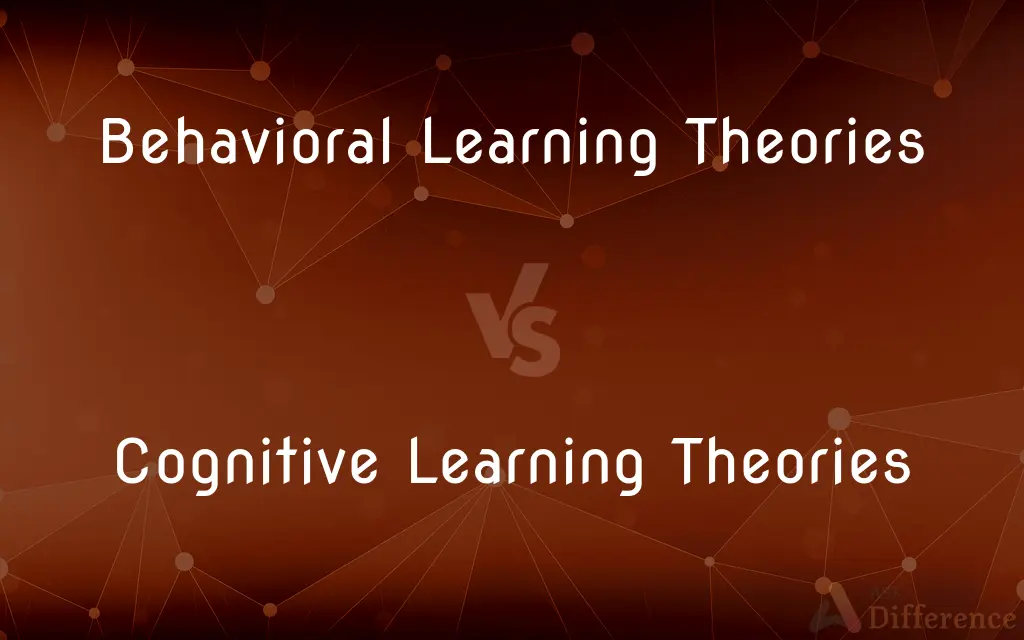Behavioral Learning Theories vs. Cognitive Learning Theories — What's the Difference?
Edited by Tayyaba Rehman — By Fiza Rafique — Published on December 21, 2023
Behavioral Learning Theories vs. Cognitive Learning Theories: Behavioral focuses on observable behaviors and reinforcement, while Cognitive delves into mental processes and understanding.

Difference Between Behavioral Learning Theories and Cognitive Learning Theories
Table of Contents
ADVERTISEMENT
Key Differences
Behavioral Learning Theories emphasize changes in observable behaviors due to external stimuli, while Cognitive Learning Theories prioritize understanding how internal mental processes influence learning.
Behavioral Learning Theories, rooted in the work of psychologists like B.F. Skinner, contend that learning is a result of conditioning and reinforcement. In contrast, Cognitive Learning Theories, informed by thinkers like Jean Piaget, assert that learning is an outcome of processes like memory, problem-solving, and perception.
When discussing Behavioral Learning Theories, attention is on how environmental interactions lead to learned behaviors. However, when exploring Cognitive Learning Theories, the spotlight is on how learners process, store, and retrieve information internally.
In practice, Behavioral Learning Theories might be evident in classrooms through reward systems or behavior modification strategies. On the other hand, Cognitive Learning Theories manifest in approaches that focus on problem-solving skills, critical thinking, or memory-enhancing techniques.
It's crucial to grasp that while Behavioral Learning Theories deal predominantly with behavior modification, Cognitive Learning Theories delve deeper into how learners comprehend, conceptualize, and apply information.
ADVERTISEMENT
Comparison Chart
Focus
Observable behaviors
Mental processes and understanding
Foundational Psychologists
B.F. Skinner, John B. Watson
Jean Piaget, Albert Bandura
Core Principle
Learning through reinforcement and conditioning
Learning through memory, perception, and problem-solving
Classroom Application
Behavior modification, reward systems
Critical thinking, problem-solving techniques
Reliance
External stimuli and environment
Internal cognitive processes
Compare with Definitions
Behavioral Learning Theories
Prioritize observable outcomes of learning.
Through Behavioral Learning Theories, teachers can modify disruptive classroom behaviors.
Cognitive Learning Theories
Delve into memory, perception, and thought.
Through Cognitive Learning Theories, educators understand the significance of prior knowledge.
Behavioral Learning Theories
Rely on reinforcement, both positive and negative.
Consistent praise, anchored in Behavioral Learning Theories, can enhance student participation.
Cognitive Learning Theories
Concerned with comprehension and application.
Encouraging debates in class reflects principles of Cognitive Learning Theories.
Behavioral Learning Theories
Focus on external stimuli and behavior changes.
The use of rewards in classrooms stems from Behavioral Learning Theories.
Cognitive Learning Theories
Highlight how learners interpret and store information.
Concept maps, inspired by Cognitive Learning Theories, help learners structure knowledge.
Behavioral Learning Theories
Rooted in conditioning processes.
Skinner's experiments with pigeons demonstrate principles of Behavioral Learning Theories.
Cognitive Learning Theories
Investigate problem-solving and critical thinking.
Incorporating puzzles in lessons draws from Cognitive Learning Theories.
Behavioral Learning Theories
Deal with behavior modification techniques.
Educators employ Behavioral Learning Theories to guide classroom management strategies.
Cognitive Learning Theories
Examine internal mental processes.
Cognitive Learning Theories shed light on how students process complex topics.
Common Curiosities
What classroom techniques resonate with Cognitive Learning Theories?
Approaches focusing on critical thinking, memory enhancement, and problem-solving are influenced by Cognitive Learning Theories.
What do Behavioral Learning Theories emphasize?
They focus on observable behaviors and the effects of external stimuli on learning.
Which thinker is linked with Cognitive Learning Theories?
Jean Piaget is a foundational figure in Cognitive Learning Theories.
How do rewards fit into Behavioral Learning Theories?
Rewards, as positive reinforcements, are key components in shaping behavior according to these theories.
Who is a key proponent of Behavioral Learning Theories?
B.F. Skinner is a notable psychologist associated with Behavioral Learning Theories.
How do Cognitive Learning Theories view problem-solving?
They see it as a reflection of a learner's ability to process, interpret, and apply information.
What's central to Cognitive Learning Theories?
They prioritize the internal mental processes that influence how information is processed, stored, and retrieved.
How might Behavioral Learning Theories be implemented in classrooms?
Through behavior modification strategies, reward systems, and conditioning techniques.
Do Cognitive Learning Theories delve into behavior modification?
Not directly; they are more concerned with understanding and mental processes in learning.
Are Behavioral Learning Theories concerned with thought processes?
No, they predominantly focus on observable behaviors and their modification.
Share Your Discovery

Previous Comparison
Trachea vs. Bronchi
Next Comparison
AAP vs. BJPAuthor Spotlight
Written by
Fiza RafiqueFiza Rafique is a skilled content writer at AskDifference.com, where she meticulously refines and enhances written pieces. Drawing from her vast editorial expertise, Fiza ensures clarity, accuracy, and precision in every article. Passionate about language, she continually seeks to elevate the quality of content for readers worldwide.
Edited by
Tayyaba RehmanTayyaba Rehman is a distinguished writer, currently serving as a primary contributor to askdifference.com. As a researcher in semantics and etymology, Tayyaba's passion for the complexity of languages and their distinctions has found a perfect home on the platform. Tayyaba delves into the intricacies of language, distinguishing between commonly confused words and phrases, thereby providing clarity for readers worldwide.













































